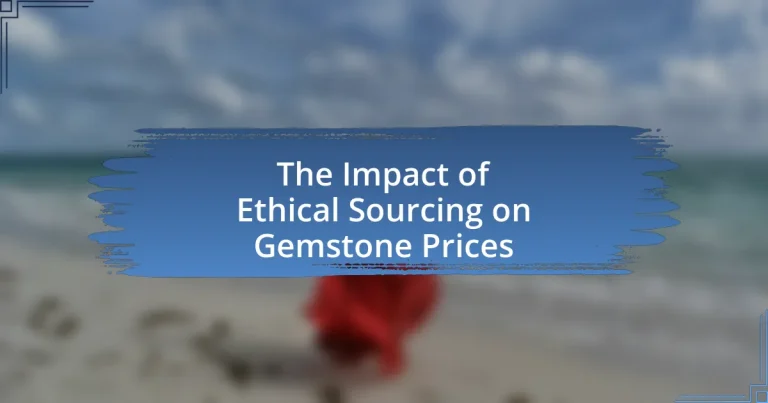The article examines the impact of ethical sourcing on gemstone prices, highlighting how consumer demand for responsibly sourced materials has led to significant price increases. Ethically sourced gemstones can command prices up to 30% higher than traditional options due to the associated production costs and consumer willingness to pay a premium for transparency and sustainability. Key factors influencing these price changes include supply and demand dynamics, consumer perceptions, and the complexities of the supply chain. The article also discusses the importance of ethical sourcing in preventing human rights violations and promoting environmental sustainability within the gemstone industry.

What is the Impact of Ethical Sourcing on Gemstone Prices?
Ethical sourcing significantly increases gemstone prices due to heightened consumer demand for responsibly sourced materials. As consumers become more aware of the social and environmental implications of gemstone mining, they are willing to pay a premium for ethically sourced stones. For instance, a report by the Responsible Jewelry Council indicates that ethically sourced diamonds can command prices up to 30% higher than their non-ethical counterparts. This price increase is driven by the perceived value of sustainability and ethical practices, which enhance brand reputation and consumer loyalty.
How does ethical sourcing influence the pricing of gemstones?
Ethical sourcing significantly increases the pricing of gemstones due to the higher costs associated with ensuring responsible mining practices and fair labor conditions. Gemstones sourced ethically often require compliance with rigorous standards, such as traceability and certification processes, which can elevate production costs. For instance, the Kimberley Process Certification Scheme, aimed at preventing conflict diamonds from entering the market, imposes additional verification steps that can lead to higher prices for ethically sourced diamonds. Furthermore, consumers are increasingly willing to pay a premium for gemstones that are certified as ethically sourced, reflecting a growing demand for transparency and social responsibility in the jewelry industry. This trend is supported by market research indicating that 66% of global consumers are willing to pay more for sustainable brands, thereby influencing the overall pricing structure of ethically sourced gemstones.
What factors contribute to the price changes in ethically sourced gemstones?
The price changes in ethically sourced gemstones are primarily influenced by supply and demand dynamics, production costs, and market trends. Supply and demand fluctuations can arise from consumer preferences for ethically sourced products, which can increase demand and subsequently raise prices. Production costs, including fair labor practices and sustainable mining methods, often lead to higher expenses compared to conventionally sourced gemstones, impacting retail prices. Additionally, market trends, such as the growing awareness of ethical consumption and environmental concerns, can shift consumer behavior, further affecting the pricing of ethically sourced gemstones.
How do consumer perceptions affect the pricing of ethically sourced gemstones?
Consumer perceptions significantly influence the pricing of ethically sourced gemstones by creating a demand for transparency and sustainability. When consumers believe that gemstones are ethically sourced, they are often willing to pay a premium, reflecting their values and preferences for responsible consumption. For instance, a study by the Gemological Institute of America found that 70% of consumers are willing to pay more for ethically sourced products, indicating a direct correlation between consumer beliefs and pricing strategies in the gemstone market. This willingness to pay higher prices drives retailers to adjust their pricing models to reflect the perceived value of ethical sourcing, thereby impacting overall market prices.
Why is ethical sourcing important in the gemstone industry?
Ethical sourcing is important in the gemstone industry because it ensures that gemstones are obtained in a manner that respects human rights and environmental standards. This practice helps to prevent exploitation, such as child labor and unsafe working conditions, which have been prevalent in regions where gemstones are mined. For instance, the Kimberley Process was established to prevent the trade of conflict diamonds, highlighting the industry’s commitment to ethical practices. Furthermore, consumers increasingly demand transparency and sustainability, which can enhance brand reputation and potentially lead to higher prices for ethically sourced gemstones. According to a 2021 survey by the Gemological Institute of America, 70% of consumers are willing to pay more for ethically sourced products, demonstrating the financial impact of ethical sourcing on gemstone prices.
What ethical concerns are associated with traditional gemstone sourcing?
Traditional gemstone sourcing raises significant ethical concerns, primarily related to human rights violations, environmental degradation, and lack of transparency. Human rights violations often occur in mining operations, where laborers, including children, may work in hazardous conditions for minimal pay, as highlighted by reports from organizations like Human Rights Watch. Environmental degradation is another critical issue, as mining practices can lead to deforestation, soil erosion, and water contamination, negatively impacting local ecosystems and communities. Furthermore, the lack of transparency in the supply chain makes it difficult for consumers to ensure that gemstones are sourced responsibly, contributing to the perpetuation of these ethical issues.
How does ethical sourcing promote sustainability in the gemstone market?
Ethical sourcing promotes sustainability in the gemstone market by ensuring that gemstones are mined and traded in ways that protect the environment and support local communities. This approach reduces the negative impacts of mining activities, such as habitat destruction and pollution, while also fostering fair labor practices and economic development in mining regions. For instance, according to the Responsible Jewelry Council, ethical sourcing initiatives often include adherence to environmental standards and community engagement, which leads to improved social and ecological outcomes. By prioritizing these practices, the gemstone market can contribute to long-term sustainability and responsible consumption.
What are the economic implications of ethical sourcing on gemstone prices?
Ethical sourcing significantly increases gemstone prices due to heightened production costs and consumer demand for responsibly sourced materials. The implementation of ethical sourcing practices often involves more rigorous labor standards, environmental protections, and traceability measures, which can raise operational expenses for suppliers. For instance, a study by the Responsible Jewelry Council found that ethical sourcing can increase costs by 20% to 30% compared to traditional sourcing methods. Additionally, consumers are increasingly willing to pay a premium for ethically sourced gemstones, with surveys indicating that over 70% of buyers prioritize ethical considerations in their purchasing decisions. This combination of increased costs and consumer willingness to pay more leads to higher market prices for ethically sourced gemstones.
How do ethical sourcing practices affect supply and demand dynamics?
Ethical sourcing practices significantly influence supply and demand dynamics by increasing consumer demand for responsibly sourced products while potentially limiting supply from non-compliant sources. As consumers become more aware of ethical issues, such as labor practices and environmental impact, they actively seek gemstones that are certified as ethically sourced. This heightened demand can lead to price increases for ethically sourced gemstones, as seen in the market trends where ethically sourced diamonds have commanded higher prices compared to traditional diamonds. Furthermore, suppliers who adhere to ethical sourcing may face constraints in their ability to meet demand due to stricter sourcing regulations and higher production costs, thereby affecting overall supply levels in the market.
What role do certifications play in the pricing of ethically sourced gemstones?
Certifications significantly influence the pricing of ethically sourced gemstones by providing verified proof of their ethical origins and quality. These certifications, such as those from the Responsible Jewellery Council or Fair Trade, assure consumers that the gemstones have been sourced without human rights violations or environmental degradation. This assurance often leads to higher consumer demand, which can elevate prices. For instance, a study by the Gemological Institute of America found that ethically certified gemstones can command prices up to 30% higher than non-certified counterparts due to the perceived value of ethical sourcing.
How does the market respond to ethical sourcing trends?
The market responds positively to ethical sourcing trends by increasing demand for ethically sourced gemstones. This heightened demand is driven by consumer awareness and preference for sustainable and responsible practices, leading to a willingness to pay premium prices. For instance, a 2021 survey by the Ethical Consumer Research Association found that 66% of consumers are willing to pay more for ethically sourced products, which directly influences market dynamics and pricing strategies in the gemstone industry. As a result, businesses that adopt ethical sourcing practices often experience enhanced brand loyalty and market share, reinforcing the trend’s impact on gemstone prices.
What are the emerging trends in consumer demand for ethically sourced gemstones?
Emerging trends in consumer demand for ethically sourced gemstones include a significant increase in awareness and preference for sustainability, transparency, and social responsibility. Consumers are increasingly seeking gemstones that are certified as ethically sourced, with a focus on fair labor practices and minimal environmental impact. According to a 2022 survey by the Gemological Institute of America, 70% of consumers expressed a willingness to pay more for ethically sourced gemstones, highlighting a shift towards valuing ethical considerations over traditional purchasing criteria. Additionally, the rise of online platforms that provide detailed sourcing information and certifications has made it easier for consumers to make informed choices, further driving demand for ethically sourced options.
How do retailers adapt their pricing strategies in response to ethical sourcing?
Retailers adapt their pricing strategies in response to ethical sourcing by incorporating the costs associated with sustainable practices into their pricing models. This adjustment often involves increasing prices to reflect the higher expenses of sourcing ethically produced gemstones, which may include fair labor practices, environmentally friendly mining methods, and certification processes. For instance, a study by the Responsible Jewelry Council indicates that consumers are willing to pay a premium of 20% to 30% for ethically sourced products, demonstrating that retailers can leverage this willingness to support their pricing strategies. Additionally, retailers may implement tiered pricing structures that differentiate ethically sourced gemstones from conventional options, thereby appealing to a market segment that prioritizes ethical considerations.
What challenges do businesses face in implementing ethical sourcing?
Businesses face several challenges in implementing ethical sourcing, including supply chain transparency, cost implications, and compliance with varying regulations. Supply chain transparency is difficult due to the complexity of sourcing materials from multiple suppliers, which can obscure unethical practices. For instance, a study by the Ethical Trading Initiative found that 60% of companies struggle to trace their supply chains effectively. Cost implications arise as ethical sourcing often requires higher upfront investments in sustainable practices and materials, which can deter businesses focused on short-term profits. Additionally, compliance with diverse regulations across different regions complicates the implementation process, as businesses must navigate varying standards for ethical sourcing. These challenges collectively hinder the effective adoption of ethical sourcing practices in the gemstone industry.
How do supply chain complexities impact the cost of ethically sourced gemstones?
Supply chain complexities significantly increase the cost of ethically sourced gemstones. These complexities arise from multiple factors, including the need for traceability, compliance with ethical standards, and the involvement of various stakeholders throughout the supply chain. For instance, the requirement to verify the origin of gemstones and ensure they are sourced from conflict-free zones necessitates extensive documentation and auditing processes, which can drive up operational costs. Additionally, ethical sourcing often involves fair labor practices and environmental considerations, further adding to the expenses. According to a report by the Responsible Jewelry Council, the costs associated with implementing ethical sourcing practices can increase gemstone prices by 20% to 30% compared to traditionally sourced gemstones.
What are the barriers to achieving transparency in gemstone sourcing?
Barriers to achieving transparency in gemstone sourcing include a lack of standardized certification processes, complex supply chains, and insufficient regulatory oversight. The absence of universally accepted standards makes it difficult to verify the ethical origins of gemstones, as different countries and companies may have varying criteria for what constitutes ethical sourcing. Additionally, the intricate nature of gemstone supply chains often involves multiple intermediaries, which can obscure the true source of the stones. Research by the Responsible Jewelry Council highlights that without stringent regulations and traceability measures, it becomes challenging to ensure that gemstones are sourced responsibly, leading to potential exploitation and environmental harm.
What best practices can businesses adopt for ethical sourcing?
Businesses can adopt several best practices for ethical sourcing, including establishing clear supplier standards, conducting regular audits, and fostering transparency throughout the supply chain. By setting specific criteria for suppliers, such as fair labor practices and environmental sustainability, businesses ensure that their sourcing aligns with ethical values. Regular audits help verify compliance with these standards, while transparency allows consumers to make informed choices about the products they purchase. According to a 2021 report by the Ethical Trading Initiative, companies that implement these practices not only enhance their brand reputation but also contribute to fairer pricing in the gemstone market, as ethical sourcing can lead to increased consumer demand for responsibly sourced products.
How can companies effectively communicate their ethical sourcing efforts to consumers?
Companies can effectively communicate their ethical sourcing efforts to consumers by utilizing transparent labeling, engaging storytelling, and leveraging digital platforms. Transparent labeling provides consumers with clear information about the origins of materials and the ethical practices involved, which builds trust. Engaging storytelling allows companies to share the narratives behind their sourcing decisions, highlighting the positive impact on communities and the environment. Digital platforms, such as social media and websites, enable companies to reach a wider audience and share real-time updates on their ethical practices, fostering a community of informed consumers. According to a 2021 Nielsen report, 73% of consumers are willing to change their consumption habits to reduce environmental impact, indicating that effective communication of ethical sourcing can influence purchasing decisions.
What strategies can enhance the marketability of ethically sourced gemstones?
To enhance the marketability of ethically sourced gemstones, implementing transparent supply chain practices is essential. Transparency builds consumer trust, as buyers increasingly seek assurance that their purchases support ethical practices. For instance, brands that provide detailed information about the sourcing process and certifications, such as those from the Responsible Jewellery Council, can significantly increase consumer confidence and willingness to pay premium prices. Additionally, leveraging storytelling in marketing campaigns can effectively communicate the positive social and environmental impacts of ethically sourced gemstones, appealing to the growing demographic of socially conscious consumers. Research indicates that 66% of global consumers are willing to pay more for sustainable brands, highlighting the importance of aligning marketing strategies with ethical values.


